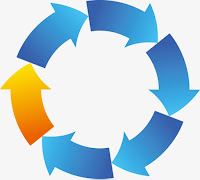I am taking courses to receive my certification as a Media Specialist. This is the new updated name to call a librarian, because in today's world, full of technology, the job no longer deals with just printed books. Many libraries collection includes e-books and audiobooks. Research is no longer done by looking in encyclopedias. So, I need to know how to help students with their research projects. I need to know websites to use, how to use databases, how to determine the reliability of the information found, how to cite information, and other similar topics. The assignment I am working on for my class will explore the research process and sharing information through blogging. I welcome any comments on suggestions as I go through this process: I hate research of this nature, and I need all the help I can get!

My first step is to determine which process I will use from the several given. Our list included: the 8Ws (Lamb), Follett's Pathways to Knowledge (Pappas & Tepe), Big 6™ (Eisenberg & Berkowitz) , Information Seeking (Kunithau), Information Process (New South Wales), Information Skills (Irving), Research Process (Pitts/Stripling), Info Zone, Research Cycle (McKenzie), and 5-As (Jukes).
The one that first caught by eye was the
Big 6™. I like that it is straightforward, has clear steps, and has guiding questions. What I don't like is that it spends a lot of time planning what you are trying to find and where and how you will go about finding this information. Ultimately, I didn't choose this method because it doesn't fit well with my style, nor my experience with the boys in my school. So, I wanted to find a method that has searching earlier in the plan.
The Research Cycle by Jamie McKenzie was more appealing, because his focus is on actively revising and rethinking your research question throughout your process. His steps are Questioning, Planning, Gathering, Sorting & Sifting, Synthesizing, Evaluating, and Reporting (after several repetition of the cycles). Unfortunately, he also had planning before gathering information.
I liked the
5-As by Jukes: Asking (key questions to be answered), Accessing (relevant information), Analyzing (the acquired information), Applying (connect the information to a task), and Assessing (the end result and the process). I found this appealing because it was simple, and its usage of alliteration (As) to help you remember the steps.
I also liked the
8Ws by Lamb: Watching (exploring), Wondering (questioning), Webbing (searching), Wiggling (evaluating), Weaving (synthesizing), Wrapping (creating), Waving (communicating), and Wishing (assessing). I liked this process because it has exploring before questioning. Again, I found the cleverness appealing because of its usage of alliteration (Ws), but especially because of the word choices such as waving and wiggling.
While all of these were appealing, I finally settled on
Info Zone: Wondering, Seeking, Choosing, Connecting, Producing, and Judging. I searched online for a clear definition of the steps (rather than just assume the obvious). I had trouble finding the information, found several brief mentions of it, but none of the links worked. I found a footnote on someone's page that they used
WayBack Machine - an archive of web pages. The funny thing is, I used this site myself a couple months back at my son's suggestion when I couldn't access a game website. (Side note: Has anyone ever told you if you put something on the internet, it is forever, even if you delete it?) Thanks to the WayBack Machine's archive, I now know that Wondering is defining the need for information, Seeking is locating and accessing resources, Choosing is understanding and appraising the information, Connecting is organizing the information, Producing is communicating the information, and Judging is evaluating the process and the product. The archived web page includes a lot of hyperlinks for each step of the process, many no longer work, but enough information is noted to enable you to find the intended reference.
Wish me luck as I set out on this journey!








No comments:
Post a Comment